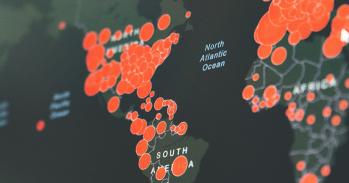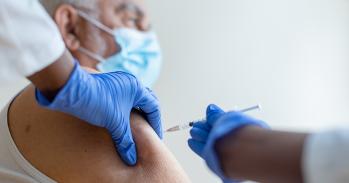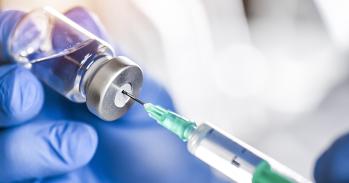
A person’s immune response to variants of SARS-CoV-2, the virus that causes COVID-19, depends on their previous exposure – and differences in the focus of immune responses will help scientists understand how to optimise vaccines in the future to provide broad protection.
A person’s immune response to variants of SARS-CoV-2, the virus that causes COVID-19, depends on their previous exposure – and differences in the focus of immune responses will help scientists understand how to optimise vaccines in the future to provide broad protection.
It was a surprise how much of a difference we saw in the focus of immune responses of different people to SARS-CoV-2.
Sam Wilks
A new study has found that people differ in how vulnerable they are to different mutations in emerging variants of SARS-CoV-2.
This is because the variant of SARS-CoV-2 a person was first exposed to determines how well their immune system responds to different parts of the virus, and how protected they are against other variants.
It also means that the same COVID-19 vaccine might work differently for different people, depending on which variants of SARS-CoV-2 they have previously been exposed to and where their immune response has focused.
The discovery underlies the importance of continuing surveillance programmes to detect the emergence of new variants, and to understand differences in immunity to SARS-CoV-2 across the population.
It will also be important for future vaccination strategies, which must consider both the virus variant a vaccine contains and how immune responses of the population may differ in their response to it.
“It was a surprise how much of a difference we saw in the focus of immune responses of different people to SARS-CoV-2. Their immune responses appear to target different specific regions of the virus, depending on which variant their body had encountered first,” said Dr Samuel Wilks at the University of Cambridge’s Centre for Pathogen Evolution in the Department of Zoology, first author of the report.
He added: “Our results mean that if the virus mutates in a specific region, some people’s immune system will not recognize the virus as well - so it could make them ill, while others may still have good protection against it.”
The research, published today in the journal Science, involved a large-scale collaboration across ten research institutes including the University of Cambridge and produced a comprehensive snapshot of early global population immunity to COVID-19.
Researchers collected 207 serum samples - extracted from blood samples - from people who had either been infected naturally with one of the many previously circulating SARS-CoV-2 variants, or who had been vaccinated against SARS-CoV-2 with different numbers of doses of the Moderna vaccine.
They then analysed the immunity these people had developed, and found significant differences between immune responses depending on which variant a person had been infected with first.
“These results give us a deep understanding of how we might optimise the design of COVID-19 booster vaccines in the future,” said Professor Derek Smith, Director of the University of Cambridge’s Centre for Pathogen Evolution in the Department of Zoology, senior author of the report.
He added: “We want to know the key virus variants to use in vaccines to best protect people in the future.”
The research used a technique called ‘antigenic cartography’ to compare the similarity of different variants of the SARS-CoV-2 virus. This measures how well human antibodies, formed in response to infection with one virus, respond to infection with a variant of that virus. It shows whether the virus has changed enough to escape the human immune response and cause disease.
The resulting ‘antigenic map’ shows the relationship between a wide selection of SARS-CoV-2 variants that have previously circulated. Omicron variants are noticeably different from the others – which helps to explain why many people still succumbed to infection with Omicron despite vaccination or previous infection with a different variant.
Immunity to COVID-19 can be acquired by having been infected with SARS-CoV-2 or by vaccination. Vaccines provide immunity without the risk from the disease or its complications. They work by activating the immune system so it will recognise and respond rapidly to exposure to SARS-CoV-2 and prevent it causing illness. But, like other viruses, the SARS-CoV-2 virus keeps mutating to try and escape human immunity.
During the first year of the pandemic, the main SARS-CoV-2 virus in circulation was the B.1 variant. Since then, multiple variants emerged that escaped pre-existing immunity, causing reinfections in people who had already had COVID.
“The study was an opportunity to really see - from the first exposure to SARS-CoV-2 onwards - what the basis of people’s immunity is, and how this differs across the population,” said Wilks.
This research was funded by the National Institute of Allergy and Infectious Diseases and National Institutes of Health.
Reference
Wilks, S H et al: ‘Mapping SARS-CoV-2 antigenic relationships and serological responses.’ Science, October 2023. DOI: 10.1126/science.adj0070
10 October 2023: New projects to kickstart future vaccine development awarded UKRI funding
The University has been awarded £3.46 million by the UKRI as part of a consortium project, PROVAC: Evolutionarily smart vaccine strain selection for proactive vaccinology.
This project aims to enhance the SARS-CoV-2 vaccine strain selection process to provide the best possible protection for the UK population. It will predict which variants may emerge in the future and measure immune responses against this potential future evolution. This will enable researchers to choose the variant of the virus to use in the next vaccine.
Continual monitoring and updating of the variant is necessary to protect those at high-risk of complications from COVID-19, who will require further vaccinations against the evolving virus.
Professor Derek Smith at the University of Cambridge’s Centre for Pathogen Evolution/ Department of Zoology will lead the consortium, which also involves researchers at Imperial College London, Francis Crick Institute, University College London Hospitals, and the University of Glasgow. The consortium is the direct result of the researchers’ substantial involvement in multiple aspects of the UK COVID-19 response.
The award is made as part of UKRI’s five-year strategy Transforming Tomorrow Together 2022 to 2027 to harness the full power of the UK’s research and innovation system to tackle large-scale, complex challenges. In total £25m has been awarded to new projects to tackle epidemics and disease mutation.
Read UKRI's full award announcement here.
This page was originally published on 6 October 2023 and last updated: 10 October 2023.

The text in this work is licensed under a Creative Commons Attribution-NonCommercial-ShareAlike 4.0 International License. Images, including our videos, are Copyright ©University of Cambridge and licensors/contributors as identified. All rights reserved. We make our image and video content available in a number of ways – as here, on our main website under its Terms and conditions, and on a range of channels including social media that permit your use and sharing of our content under their respective Terms.




